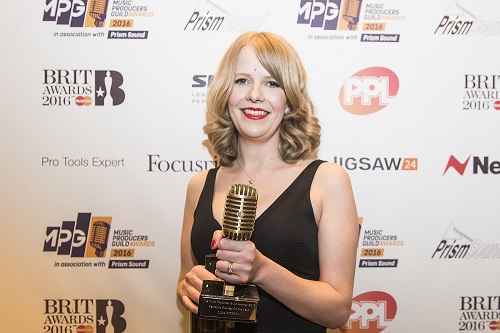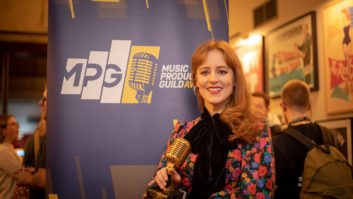
Recording engineer Olga FitzRoy has launched a national campaign to get Shared Parental Pay extended to self-employed parents who currently don’t benefit from this scheme.
With the backing and support of the Music Producers Guild, of which FitzRoy is both a member and MPG Award winner, the Parental Pay Equality Campaign aims to right this injustice by asking Government to change an inflexible piece of legislation into something that works for all parents.
The campaign is now gathering survey data with a view to submitting this as evidence to the Taylor Review on Modern Employment Practices before it closes on May 17th 2017.
Under current legislation, PAYE employees can claim 39 weeks of statutory Shared Parental Pay (ShPP), which they can share between them in up to three separate blocks (or more if employers agree). Self-employed men can claim no parental pay whatsoever, while self-employed mothers are only entitled to Maternity Allowance (MA) which, although paid at the same rate as ShPP, cannot be shared with a partner or split into blocks. This effectively forces the mother into being the main caregiver and financially penalises families that want to share childcare.
FitzRoy became aware of this issue when she had her first child in 2015, soon after ShPP legislation came into force. Keen to split care of her son with her husband, she was shocked to discover that she wasn’t eligible.
“I love my career and want to maintain it, so sharing childcare was very important to both of us,” she explains. “Maternity Allowance forces self-employed women to take all their maternity leave in one block, without the option to dip in and out of work in that first year. You can work for 10 days while claiming this allowance, but after using those days I was faced with the choice of either turning down jobs that I would otherwise be happy to do, or stop my maternity allowance completely, with no option of claiming it between jobs when I was spending time at home with my baby.”
While current regulations are detrimental to women’s businesses and unfair to self-employed fathers, having access to the flexibility of ShPP is especially important for the self-employed because they do not have the same legal protections or job security as employees do.
“I think it is particularly relevant to the creative industries, where many people work on a project by project basis and so could do with the flexibility of splitting their maternity leave, and sharing childcare with a partner,” FitzRoy says. “Many women want to work in the first year after having a baby, both because they enjoy their work and because of the need to maintain client relationships. The fact that Shared Parental Leave only had an uptake of 1% means that more needs to change.”
Music Producers Guild Executive Board member Cameron Craig says: “We are very keen to support this campaign because the issue does affect all self-employed people, especially those in the music and recording business where a high percentage are self employed. The survey will provide important data to submit to the Taylor Review and we would encourage everyone affected to take part in it.”
Alongside the Music Producers Guild, a number of organisations UK Music, the Musicians Union, BECTU, BASCA, WomenInFilmAndTV, Working Families Charity, Parents In Performing Arts (PIPA) and the maternity discrimination blog PregnantThenScrewed.com have all voiced support for the campaign.
Anyone who would like to take part in its survey can do so by following this link. http://www.parentalpayequality.org.uk/survey/ More information is available at this link http://www.parentalpayequality.org.uk and Twitter is @ShPPEquality.
-ends-
About Music Producers Guild (UK):
The Music Producers Guild (UK) is an independent and democratic organisation that encourages the highest standards of music production, and actively engages with other music industry organisations to campaign and lobby on matters of important mutual interest.
The MPG represents and promotes the interests of all those involved in the production of recorded music, including producers, engineers, mixers, re-mixers, programmers and mastering engineers.
www.mpg.org






